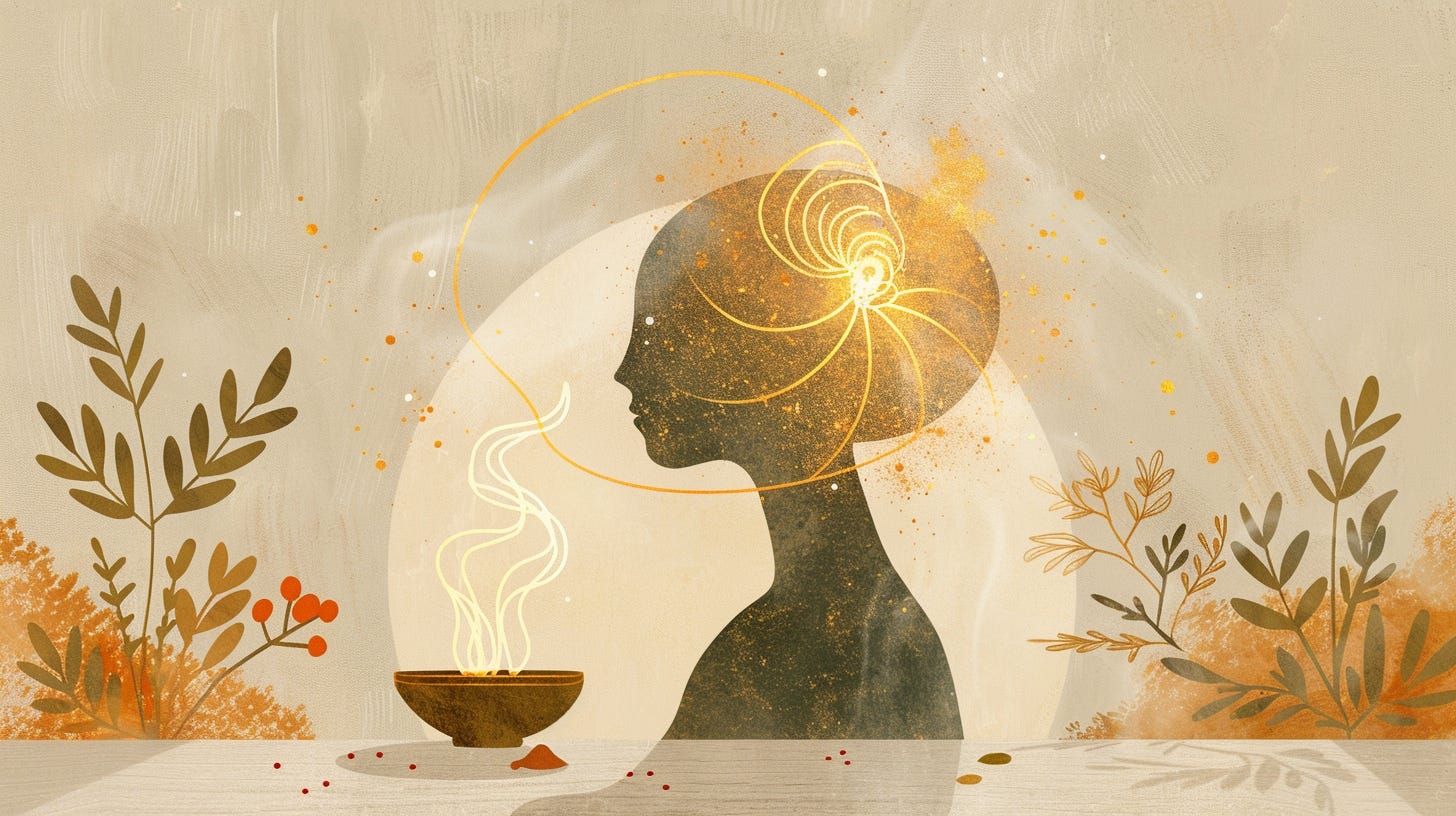The Digestion Paradox: Why 'Perfect' Eating Can Still Leave You Empty
Your body can’t absorb what your life can’t digest.
The kitchen that worked
I have a friend who is beautiful in all the ways, inside and out.
Let me take you straight to her kitchen for a moment: it's envy-provoking:
Her kitchen looks like calm itself: spacious, clean, light filled, warm colors, a generous island for cooking with friends and having warm conversations with tea, and appliances that hum like a spa. The cabinets hold only what matters: spices, teas, fresh produce. Nothing screams buffalo wings. Everything whispers you are making good choices.
She lives it. Certifications in yoga and reiki, more trainings each year, and vegetarian, she’s totally devoted to her wellness.
But still, everything bothers her.
She gets migraines and body aches. She’s often tired. She’s sensitive to many foods, and she’s gluten free. She’s sensitive to people too – some days only a few feel safe.
She keeps searching. Things work until they don’t, so she looks again.
Zoom out, the paradox.
Wellness is a giant industry because chronic issues, including mental health, keep climbing. We want energy and agency. We want a body that works for us.
You’ve heard the stories: someone runs daily, eats by the book, then has a heart attack in their 40s. Someone else smokes cigars, sips martinis, and lives to be 100. Outliers, perhaps. But also, it’s a nudge to look deeper.
I keep returning to one common thread I see across studies and in real life: connection. People who feel connected to themselves and to others tend to have better heart health and longevity than those who feel lonely.
Connection changes the body.
And gut, heart, mental, emotional, and physical health are all intertwined.
Food doesn’t exist outside of life
You’ve heard me say this:
True digestion isn’t just about food; it’s about your ability to digest life: your experiences, emotions, and bonds.
Eating happens inside a life.
It’s how you gather, keep rhythm, mark time, and celebrate. So how you feel about food sits right besides what you eat.
When healthy turns heavy
My own path began with macrobiotics. I met brilliant practitioners who could win valedictorian if food rules were school. Yet many felt cut off from their emotions and struggled with intimacy and joy.
In spiritual circles, I saw a similar thing.
There’s a name for this shadow side: Wellness Orthorexia: an obsession with eating healthy, pure, clean food that can harm overall well-being.
Perfection becomes a form of control. It ignores the wisdom of the body and the joy of eating. Fear creeps in and the nervous system reads it.
What stress does to digestion
When we’re stressed, the brain signals the gut — through the vagus nerve — to protect. Digestion downshifts. Heart rate climbs.
We tell ourselves we’re fine, so the stress goes underground.
We eat healthy, but our body can’t absorb well. Gut motility slows, and stress hormones shift the microbiome, reducing beneficial bacteria and increasing harmful ones. Inflammation rises. Stress rises. The loop tightens.
And we lose touch with our senses and intuition. Food becomes right or wrong instead of a relationship.
Agni, and the question that matters
In Ayurveda, agni is digestive fire. It’s more than metabolism. It’s digestion, assimilation, and the conversion of experience into energy and clarity. Agni turns food into intelligence and helps you digest emotions and information.
So the daily question becomes:
did you digest the day?
The gut-brain loop
There’s a communication line between your gut and your brain, and it’s called the vagus nerve.
Emotions send rapid signals between the two and affect hormones and microbes.
Stress, sadness, and anger, each shifts gut function, which then loops back to mood. Empty and hurting follow, which triggers more inflammation in your body’s attempt to protect you.
How to step out of this loop
Rather than chasing “perfect” eating, build emotional resilience and mindful eating.
Resilience doesn’t mean you’re always positive. It means you can feel fully and return back to steady in appropriate time – i.e. a death takes longer than a canceled plan. That’s wise timing, not weakness.
Practices that help right now
Here are some ways to cultivate resilience and break the loop:
Practice mindfulness and meditation: use the 5-day reset as a container.
Get outside for sun, air, and perspective.
Journal to unload, ask better questions, and hear yourself.
Connect with people you care about. This matters more than you think. If you know this already, don’t just know it – do it.
Create daily. Your thang brings meaning back online and digestion follows.
Here’s how to do it through food – by reclaiming the joy of eating:
Cook with love and intention.
Eat with awareness and gratitude.
Savor each bite.
Share meals with people you love.
Honor family and cultural food traditions without guilt.
Remember the point
Of course wellness matters.
And, it’s not that serious.
Like chasing joy, chasing wellness can make it elusive.
Let go of perfection and embrace a more flexible and intuitive approach. It gets easier with practice.
Remember: no one really gets it right. We all practice.
A gentle tool for listening
I made a Gut Check Worksheet to help you tune into your body’s wisdom through your appetite, digestion, elimination, and mood.
It’s for listening with compassion, not for scoring yourself.
Use it to notice how emotions and daily life touch your agni.
Here it is below.
– Savitree
Your Guide to Food as Medicine: I'm here to help you unlock your natural vitality through the power of food and mindful living.



